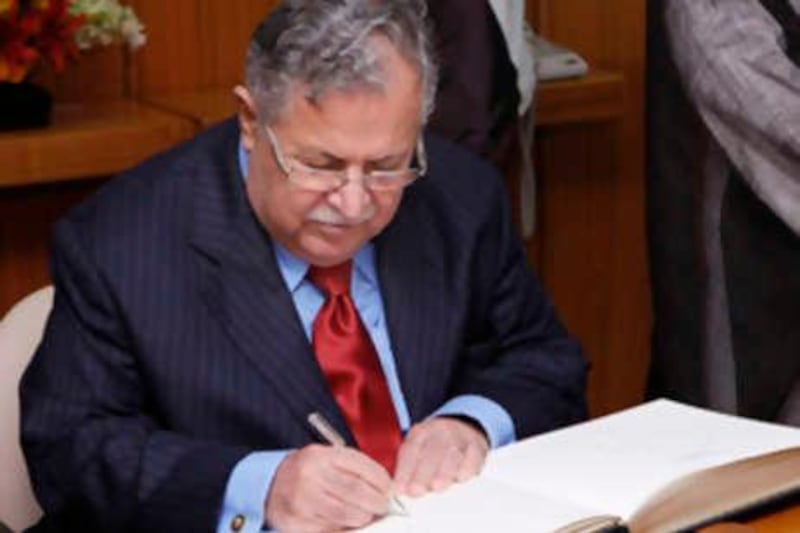BAGHDAD // Iraq's parliament passed a provincial elections law today after months of arguing between Arabs and Kurds, and called for the vote to be held before Jan 31 next year, legislators said. The polls had been scheduled for Oct 1 but the law governing how the vote should be conducted stalled in parliament over how to treat the northern oil-rich city of Kirkuk, where control is disputed by Kurds, Arabs and ethnic Turkmen.
The law now goes to Iraq's three-member presidency council, headed by the president Jalal Talabani, for approval. Mr Talabani rejected an earlier version that was approved by legislators in July and sent it back to parliament. Salim al-Jubouri, a senior parliamentarian from the Sunni Arab Accordance Front, said the law had been passed unanimously with Kurds and Arabs in attendance. All sides had made concessions on Kirkuk, he said, adding there would be a separate law for dealing with elections in Kirkuk as well as a power-sharing formula for the city administration.
Local elections are seen as a test of Iraq's democracy and Washington hopes they will help reconcile rival groups, especially Sunni Arabs who boycotted the last provincial polls in 2005 and, without a say in local government, now feel marginalised in areas where they are numerically dominant. The polls could also lead to tension between competing groups, especially in the Shi'ite south where there is expected to be a struggle for power in a region that holds most of the country's known reserves of oil.
The earlier version of the law passed by parliament and rejected by Mr Talabani, a Kurd, would have divided council seats equally between Kirkuk's ethnic groups. Kurdish MPs had boycotted the session in protest. Kurds believe they are numerically superior in Kirkuk, which they consider their ancient capital and want to fold into their largely autonomous northern region. Kirkuk's Arabs and Turkmen want the city to remain under central government authority.
Bahaa al-Araji, the head of parliament's legal committee, told reporters a compromise on Kirkuk had been reached. "We tell our brothers in the south, the centre of Iraq and Kurdistan that this is an achievement by parliament. The elections will be soon, so the people of Iraq can put forward their votes to select new local government," Mr Araji said. The UN special representative to Iraq had cautioned that delays to the elections risked "delegitimising" current provincial councils.
The new law is expected to change some of the voting procedures from legislation used for the last local elections in January 2005. Drafts of the new law also barred any party that had a militia from competing. It was not immediately clear if this provision was in the version that was approved. The Electoral Commission had said the new law would need to be passed by mid-September to allow time for the polls to be held this year.





